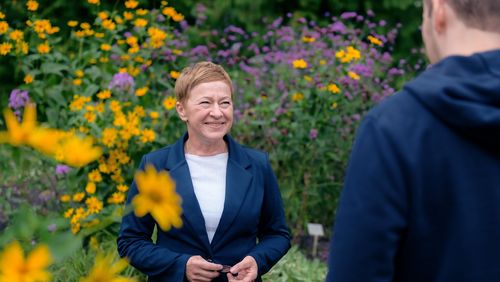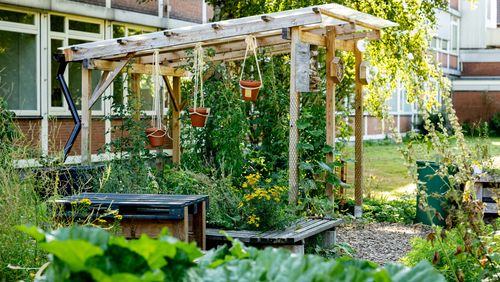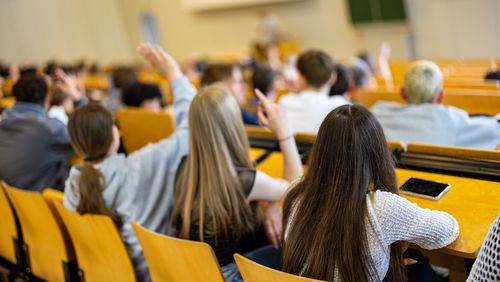In the post-Brexit era, German and British universities are seeking new ways to collaborate. Thanks to a programme funded by the State of Lower Saxony, chemists Lena Albers from Oldenburg and Catherine Weetman from Glasgow are working together on a joint research project.
Dr Lena Albers has good memories of her time in Edinburgh. "I love Scotland and really enjoyed my stay there," says Albers, a researcher in the Inorganic Chemistry group at the University of Oldenburg. in 2016 and 2017 she did research as a postdoc on the synthesis of aluminium compounds at the University of Edinburgh – and met Dr Catherine Weetman, also a chemist and postdoc working in a different research group. "Our research is different, but there are many similarities: we both focus on similar elements and highly reactive compounds," says Albers.
Since early December, the two chemists have been working together to develop new, environmentally friendly catalysts – molecules that accelerate chemical reactions without undergoing any changes themselves in the process. Weetmann, who now works at the University of Strathclyde in Glasgow, spent three weeks in Oldenburg in December, and this spring Albers will travel to Scotland to continue their joint project. Their collaboration was made possible by the Lower Saxony – Scotland Tandem Fellowship Programme, which is funded by the Ministry of Science and Culture of Lower Saxony.
"It was a really good opportunity for us," says Catherine Weetman. Over the next eleven months, she and Albers will work together to design new catalysts on the basis of common main group elements such as silicon and calcium, magnesium and aluminium. "We want to make special molecules with a double bond between two atoms," Albers explains. Such molecules are very effective at activating other substances, especially small molecules like carbon dioxide, whose atoms are held together by strong bonds, she explains. These catalysts could be used to trigger reactions in greenhouse gases and thus create the prerequisite for removing them from the air or from exhaust gases.
A substitute for platin and palladium
Catalysts also play an important role in the chemical industry – in the production of fuels, medicines or fertilizers, for example. Currently it is mainly extremely rare, expensive and in some cases toxic metals such as palladium or platinum that are used to purify exhaust gases in the exhausts of cars with internal combustion engines. "The catalysts we are working on will be much cheaper than palladium, for example, and they will make chemical processes more sustainable," Weetman explains.
In their project, the two chemists combine experimental and theoretical methods: they develop compounds that are likely to be highly reactive and use computational modelling which enables them to predict properties such as a compound's catalytic potential without having to test it in the lab. With this approach, the researchers can make the most of each other's expertise. Albers is teaching Weetman how to make the compounds in which the Oldenburg research group led by Prof. Dr. Thomas Müller specializes and introducing her to quantum chemical model calculation. And when Albers goes to Glasgow, she will learn new lab techniques and how to handle magnesium and calcium compounds.
This uncomplicated collaboration between British and German researchers can't be taken for granted these days: since the UK's exit from the European Union it has become much more difficult to organize joint research projects. According to a survey published by the Donors' Association for the Promotion of Humanities and Sciences (Stifterverband) in November 2021, more than half of Germany's universities expect a decline in the number of research collaborations with British partner institutions. "In addition, new visa regulations for longer stays also hinder the exchange of ideas among researchers, and plans for the UK to remain in the new Horizon Europe programme continue to hang in the balance," the report says.
Working together despite Brexit
The Lower Saxony – Scotland Tandem Fellowship Programme, which was launched in 2019 following a visit to Scotland by Science Minister of Lower Saxony Björn Thümler, offers researchers from Lower Saxony and Scotland the opportunity to continue working together despite Brexit. As a kickoff event in November 2021, the first four tandems selected for the programme presented their research projects at a hybrid (online and in-person) conference. Albers and Weetman, who are the only team from the natural sciences, both said they enjoyed the stimulating discussions with other participants from completely different areas of research.
Once their participation in the Fellowship Programme comes to an end the two scientists hope to establish a permanent collaboration between their respective research groups, for example through PhD student exchanges or by jointly applying for follow-up projects if their current one proves successful. "We are both very optimistic," says Weetman. Albers is also confident: "We will definitely get new compounds."




